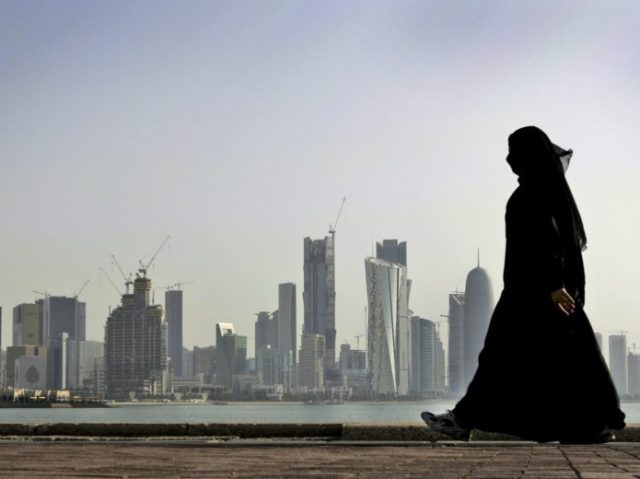The nonprofit Counter Extremism Project (CEP) is calling on international companies and U.S. President Donald Trump’s administration to repudiate any business dealings with the Qatari government, arguing that the Gulf country willingly shelters Islamic terrorists and funds jihadist organizations.
“There is precedent in the U.S. for both government and private action to pressure states that engage in threatening and destabilizing behavior,” David Ibsen, the executive director of the U.S.-based non-governmental organization (NGO), told Breitbart News. “Qatar’s history of support for extremist groups is clear and it, therefore, would not be surprising if the US administration, as well as private citizens, began demanding that companies reconsider their Qatar business activities.”
In a June 27 letter warning American Airlines to avoid conducting business with Doha, CEP expressed its concerns about Qatar’s links to money laundering and various jihadist groups, namely al-Qaeda, the Taliban, Hamas, the Muslim Brotherhood (MB), and the Islamic State (ISIS/ISIL).
CEP’s letter comes on the heels of news reports that state-owned Qatar Airways sent an “unsolicited notice” to American Airlines, saying it plans to acquire as much as 10 percent of the U.S. company.
“Serious legal, financial, commercial, and reputational risks associated with operating in and doing business with Qatar will continue for the foreseeable future—unless and until Qatar fundamentally changes its behavior and Qatar verifiably abandons its manifest support of terrorist and extremist groups and individuals,” wrote CEP to American Airlines. “Consequently, prudent companies should conclude that business opportunities, partnerships, and ties in and with Qatar and its affiliated agencies are not worth the risk.”
CEP is planning to send a similar letter to various other multinational companies, including Siemens, Volkswagen, Glencore, Barclays, counter terrorismRoyal Dutch Shell, Credit Suisse, Iberdrola, BHP Billiton, Hapag LloydAccor Hotels, and Vinci.
In the letter, the nonprofit noted that the Trump administration could impose sanctions on Qatar that would prohibit any U.S.-based person or entity from doing business with Doha.
“In the United States, the penalties imposed for violating sanctions are significant, including asset freezes and seizures, prohibitions on transactions with the U.S. financial system, and bans on importation of U.S.-origin goods,” noted CEP. “Civil or criminal penalties may also be assessed under the U.S. Anti-Terrorism Act, which authorize sanctions on any persons, including U.S.-based companies, who provide financial, material, or technological support to or on behalf of foreign persons designated for involvement in acts of terrorism that threaten U.S. national security.”
Bahrain, Egypt, Libya, the Maldives, Saudi Arabia, the United Arab Emirates (UAE), and Yemen have severed ties with Qatar over its support of Islamic terrorism and extremism.
Before making a similar decision, the United States would have to consider that the presence of its military base in Qatar, considered the largest in the Middle East and home to an estimated 10,000 American troops.
Nevertheless, President Trump has joined Saudi Arabia and the other Muslim countries in condemning Qatar for its links to Islamic extremists and state-sponsor of terrorism Iran.
“It’s not enough for the Qatari’s to make commitments to change behavior. The U.S. should support its GCC [Gulf Cooperation Council] allies and stress the need for Qatar to demonstrate to the region and international community through action how it has changed, whether by enforccounter-terrorismlaws, or expelling known terror actors residing in Doha,” said Ibsen in support of the Trump administration taking action against Qatar. “Given such evidence, the US would be best positioned to mediate a resolution that would result in an optimal position for all.”
On Sunday, President Trump expressed his “concerns about the ongoing dispute” between Qatar and its Gulf and Arab countries when he spoke separately to the leaders of Saudi Arabia, Abu Dhabi, and Qatar, revealed the White House.
“He reiterated the importance of stopping terrorist financing and discrediting extremist ideology. The president also underscored that unity in the region is critical to accomplishing the Riyadh Summit’s goals of defeating terrorism and promoting regional stability,” said the White House said.
The GCC, which includes Bahrain, Kuwait, Oman, Qatar, Saudi Arabia, and the UAE, is a regional intergovernmental alliance of all Arab countries of the Persian Gulf except for Iraq.
Various GCC members and Egypt have boycotted Qatar.
Saudi Arabia – considered the most powerful member of the coalition – the UAE, Bahrain, and Egypt have extended by 48 hours Sunday’s deadline for Qatar to abide by a set of demands that Doha has already rejected, reports Al Jazeera.
CEP has expressed support for the 13-point ultimatum, which demands that Doha cut off all ties with Islamic terrorist groups, namely Iran’s narco-terrorist proxy Hezbollah, al-Qaeda, ISIS, and the Muslim Brothers.
The countries also demand that Qatar: sever any affiliation with Iran, shut down the Al-Jazeera network, close a Turkish military base, and pay an unspecified amount of money for the “loss of life and other financial losses caused by Qatar’s policies.”
Meanwhile, a State Department official said Sunday that the Trump administration encourages “all parties to exercise restraint to allow for productive diplomatic discussions. We are not going to get ahead of those discussions. We fully support Kuwaiti mediation.”

COMMENTS
Please let us know if you're having issues with commenting.